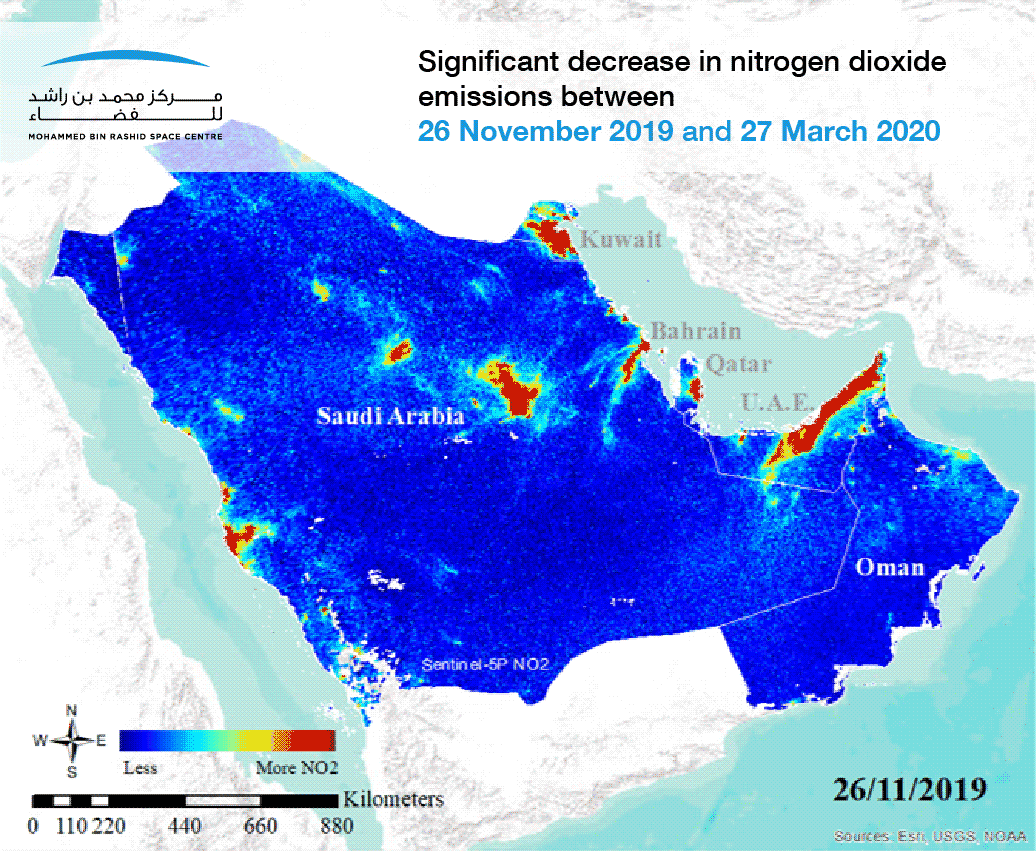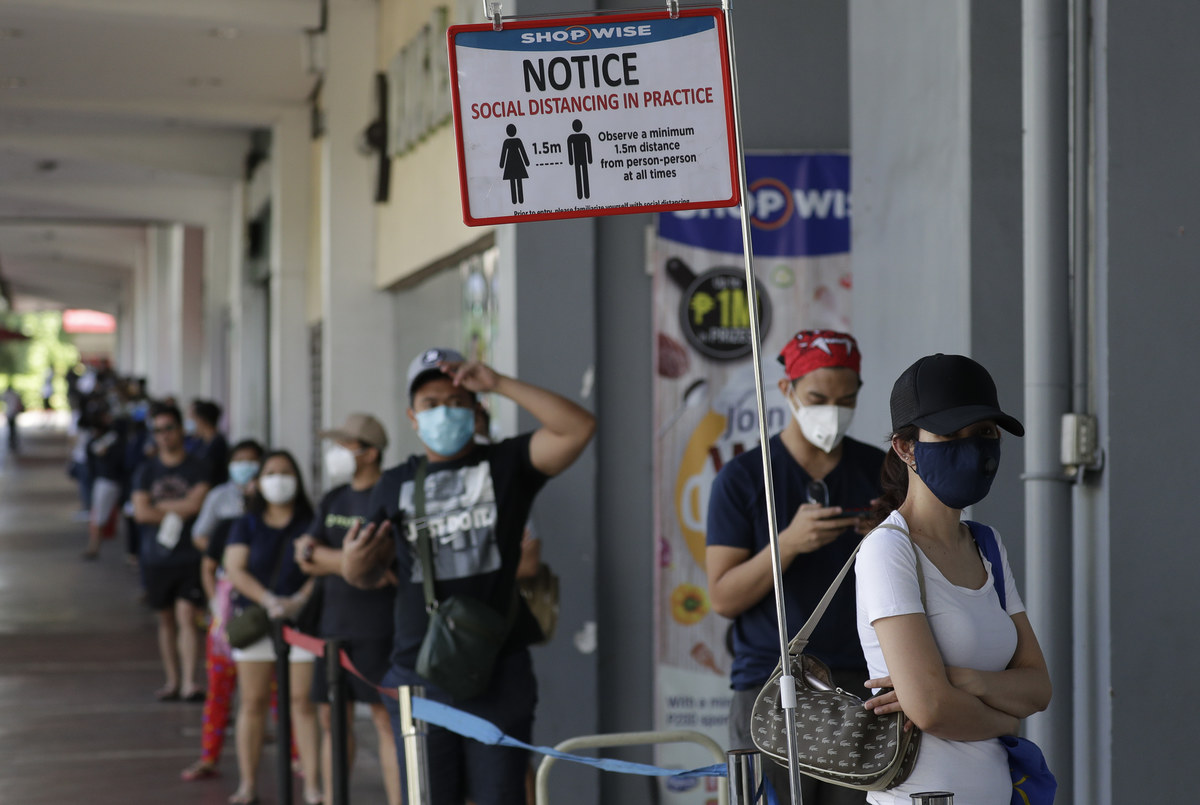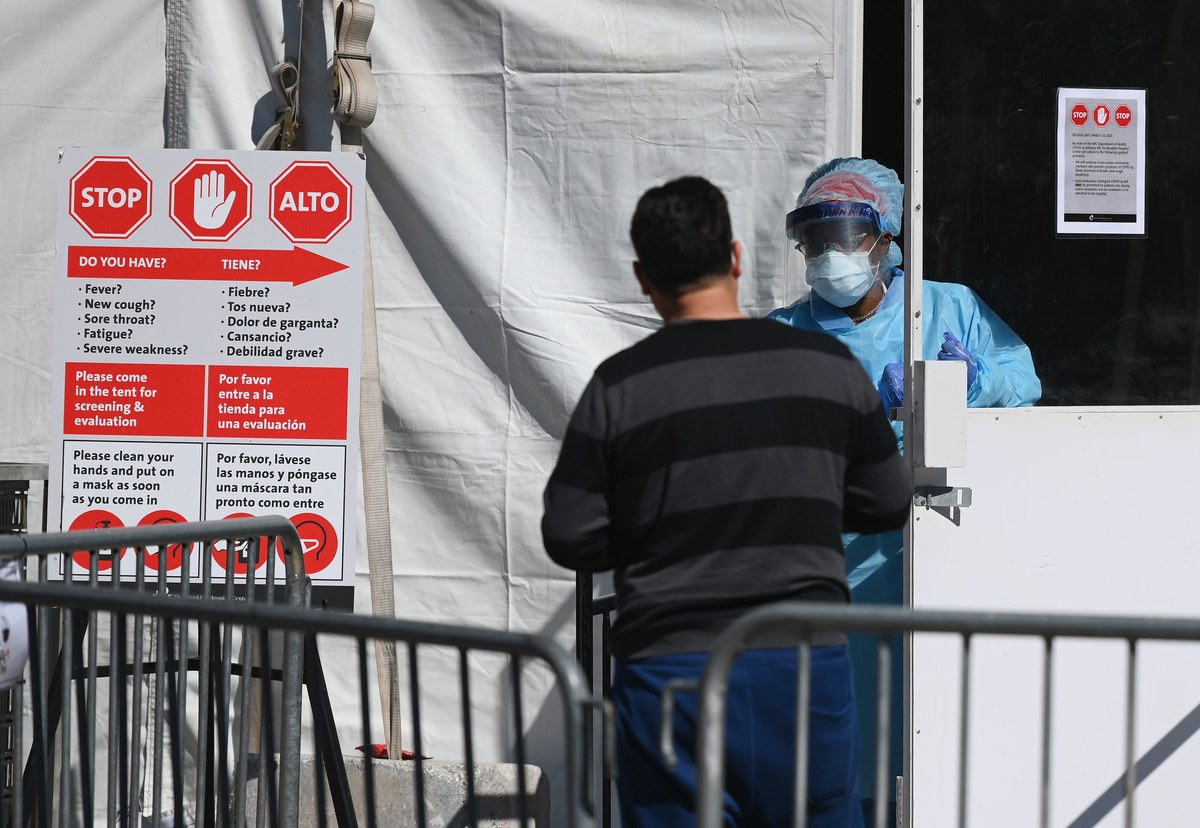DUBAI: Middle East countries continue to implement containment measures to prevent the spread of coronavirus as cases topped 850,000 and over 42,000 deaths globally.
The pandemic red zone has shifted west from China, with the United States now harder hit than any other country, with almost 200,000 cases.
The coronavirus scourge in Europe is also being felt in Italy, Spain, Germany and the United Kingdom, with more than a quarter-of-a-million cases and rising, as people slowly start to follow official advice to stay at home and follow social distancing.
Wednesday, April 1 (All times in GMT)
20:50 - Egypt recorded 69 new coronavirus cases, bringing the total to 779.
20:40 - 15 new coronavirus cases reported in the Palestinian Territories, bringing the total to 169.
20:00 - Prime Minister Boris Johnson on Wednesday lamented the latest coronavirus data that showed a record increase of deaths in Britain, saying it was a "sad, sad day."
Earlier, the government said fatalities rose by 563 to a total of 2,352 by 1600 GMT on March 31.
"Let's be in no doubt this has been a sad, sad day," Johnson said in a video message posted on Twitter.
"But let's be in no doubt that if we can follow the programme that we are currently set upon, if we can comply with the measures that we've embarked on together, then I have absolutely no doubt that we will begin to start to push those numbers down."
19:47 - The UN’s COP 26 climate change summit due to take place in the Scottish city of Glasgow in November has been postponed due to the coronavirus pandemic, the British government said on Wednesday.
“In light of the ongoing, worldwide effects of COVID-19, holding an ambitious, inclusive COP26 in November 2020 is no longer possible,” the government said in a statement, adding that dates for a rescheduled conference in 2021 would be announced later.
19:05 - Britain will mobilise 3,000 reservists with specialist skills as part of its response to the coronavirus outbreak, the Ministry of Defence said on Wednesday.
"It is expected that 3,000 reservists will be required as part of this tranche and will initially be mobilised for six months, to be kept under review," the ministry said.
"The Reserve Forces will be used to help deliver a range of activities, such as providing additional medical and logistical support for the NHS (National Health Service), acting as liaison officers and deploying specialist skills such as engineering and accounting."
19:00 - The US on Wednesday surpassed 200,000 novel coronavirus cases, according to a tally kept by Johns Hopkins University.
The pandemic has claimed the lives of at least 4,361 people in the United States, which leads the world in the number of confirmed infections with 203,608, by the Johns Hopkins count.
18:40 - Two more deaths from the virus have been reported in the UAE, bringing the country's total death toll to 8 people.
18:25 - Qatar recorded 54 new coronavirus cases, bringing the total to 835 cases.
Read more: Work from home to curb coronavirus, Qatar tells private firms
18:15 - France on Wednesday reported its highest daily number of deaths from COVID-19 since the coronavirus epidemic began, saying 509 more people had died in hospital to bring the toll to 4,032.
There are now 24,639 people hospitalised in France with COVID-19, with 6,017 of them in intensive care, health official Jerome Salomon told reporters in his daily update. The death toll on Tuesday had risen by 499.
The French death toll includes only those who died in hospital and not those who died at home or in old people's homes.

17:45 - World Health Organization's Tedros says he is "deeply concerned" about the rapid escalation and global spread of the coronavirus, and that in the past five weeks there has been a "near exponential growth" in the number of new cases and the number of deaths has more than doubled.
17:35 - Jordan recordsd four new coronavirus cases and six recovered, bringing the total to 278.
16:55 - Turkey's coronavirus death toll rises by 63 to 277, 2,148 new cases confirmed, the health minister said.
16:35 - It would be unacceptable for banks to unfairly refuse funds to good businesses which are in difficulty because of the coronavirus pandemic, Britain's business minister said on Wednesday.
"Just as the taxpayer stepped in to help the banks back in 2008, we will work with the banks to do everything they can to repay that favour and support the businesses and people of the United Kingdom in their time of need," Alok Sharma told a news conference.
16:30 - The rise in new coronavirus cases in Britain is concerning, as are the rates of hospital admissions in London and the Midlands, Public Health England's medical director Yvonne Doyle said on Wednesday.
"(The number of new cases) is slightly concerning, it's still too early to say whether the plateau of hospital admissions have ended," Doyle said, noting that the number of new cases had risen every day for the past three days.
"The threat is everywhere. We need to protect the NHS (National Health Service) everywhere, and the Midlands now is obviously a concern as well," she said.
Testing of frontline staff will go from the thousands to hundreds of thousands within the coming weeks, Doyle added.
"We are very committed to our NHS (National Health Service) frontline staff," she told a news conference, declining to give more precise information on testing numbers or timescales.
16:25 - New York statewide coronavirus deaths increases to 1,941, up from 1,550, cases increases to 83,712, up from 75,795 from a day earlier, Governor Andrew Cuomo said.
16:15 - Italy's death toll from coronavirus outbreak rises by 727 to 13,155 and total number of confirmed cases rises to 110,574 from 105,792 on Tuesday, an official said.
15:30 - The case numbers in New York City and the wider New York state continue to rise, as do the deaths, forcing officials there to take drastic action...
16:37 - Canada's coronavirus cases rise to 9,017 on April 1, from 7,708 on March 31; 105 deaths, up from 89.
15:05 - Wimbledon was canceled because of the coronavirus pandemic, the first time since World War II that the oldest Grand Slam tennis tournament won’t be played.
The All England Club announced after an emergency meeting that the event it refers to simply as The Championships is being scrapped for 2020.
14:20 - Arab News' Tarek Ali Ahmad reports from the streets of London...
13:50 - Some positive news amid all the gloom!
13:35 - The number of people with coronavirus who have died in Britain rose by 563 to a total 2,352 by 1600 GMT on March 31, the government said on Wednesday.
It said there were 29,474 confirmed cases of the virus at as 0800 GMT on Wednesday, up from 25,150 the day before.
13:15 - Saudi Arabia’s Ministry of Health announced 157 new cases of coronavirus on Wednesday, bringing the total number of cases in the Kingdom to 1,720.
13:05 - British author J. K. Rowling is hoping her much-loved Harry Potter series will work its magic on bored children stuck at home during the coronavirus lockdown.
Harry Potter and the Philosopher's Stone, the first book in the series about the boy wizard, will be available for free worldwide as an ebook and audiobook throughout April, as part of an initiative to help parents, carers and teachers entertain housebound children, Rowling announced on Wednesday.
13:00 - Around 1.5 million Israelis have downloaded a mobile app in the past week that alerts users who have crossed paths with a coronavirus patient, according to the Health Ministry, helping to improve tracking of the pandemic.

12:55 - Edinburgh's five annual international festivals, including the Fringe arts event, have been cancelled because of the coronavirus crisis, organisers said on Wednesday.
"For the first time in over 70 years, the five festivals that transform Edinburgh into the world's leading cultural destination every August are not going ahead this year due to concerns around the COVID-19 pandemic," they said in a statement.
12:45 - Confirmed coronavirus cases in Spain rose beyond 100,000 as it recorded its biggest one-day death toll from the outbreak on Wednesday, and two planes packed with protective equipment arrived to restock an overloaded public health system.
Barring Italy, the virus has killed more people in Spain than anywhere else, triggering a lockdown that has brought economic activity to a virtual standstill. A survey showed Spain's manufacturing sector is heading for slump after shrinking in March at its steepest pace since 2013.
11:05 – Japan’s Prime Minister Shinzo Abe said on Wednesday the government was expanding a ban on the entry of non-Japanese people to cover 73 countries as policymakers try to contain the coronavirus outbreak. The number of countries was increased by 49, including the United States, China and South Korea, he said.
10:10 – Lebanon has recorded 16 new coronavirus cases, bringing the total number of infected cases in the country to 479 cases.
10:05 – The COVID-19 regulations which limited movement have also caused a drop in nitrogen dioxide (NO2) concentrations around the globe.
According to the World Health Organisation (WHO), NO2 is mainly produced by engines, power generation and other industrial processes.
The Mohammed Bin Rashid Space Centre (MBRSC) released a GIF image of the decrease NO2 concentration in the GCC countries, between 26 November 2019 until 27 March 2020, using data collected by the European Space Agency’s Sentinel-5P mission.

09:55 – The number of cases of coronavirus in Spain surpassed 100,000 on Wednesday while the number of fatalities reported overnight reached a new record, the country’s health ministry said.
09:40 – Iraq’s Ministry of Defense has announced further movement restrictions to stop spread of coronavirus.
09:35 – Iran has reported that total coronavirus patients number reached 47,593, and deaths increased to 3,036.
09:30 – NATO Secretary General Jens Stoltenberg said they ready to help in the long-running coronavirus crisis.
JOIN LIVE NOW
Virtual pre-ministerial press conference ahead of #NATO #ForMin tomorrow. https://t.co/naImFohMYR
— Jens Stoltenberg (@jensstoltenberg) April 1, 2020
09:15 – Kuwait’s Ministry of Health has confirmed 28 new infections of coronavirus, bringing total to 317, with 80 recoveries.
09:10 – Malaysia reported 142 new coronavirus cases on Wednesday, taking the total to 2,908, the highest in Southeast Asia.
The health ministry said it has recorded a total of 45 deaths, with two reported on Wednesday.
09:00 – Iraq has recorded 6 new cases of coronavirus, and total number rose to 176.
08:55 – Indonesia confirmed on Wednesday 149 new coronavirus infections, taking the total in the Southeast Asian country to 1,677, a health ministry official said. Achmad Yurianto reported 21 new deaths from the virus, taking the total to 157, while 103 had recovered.
08:50 – A Russian military plane carrying medical equipment has departed for the United States, the defense ministry in Moscow said, as the Kremlin flexes its soft power amid the coronavirus pandemic.
08:30 – The Philippines recorded 227 new coronavirus cases and eight more deaths on Wednesday, the health ministry said. The latest figures brought the total number of infections and deaths in the country to 2,311 and 96, respectively.

A reminder to maintain social distancing is posted as a queue of shoppers wait for their turn to enter a supermarket Manila, Philippines on Wednesday, April 1, 2020. (AP)
08:05 – Morocco has detected 21 new coronavirus cases, bringing the total to 638.
08:00 – Iran’s president said the United States had missed a historical opportunity to lift sanctions on his country during the coronavirus outbreak, though he said the penalties had not hampered Tehran’s fight against the infection.
07:40 – Oman has confirmed 18 new coronavirus cases, increasing the toll to 210.
06:40 – Iranian President Hassan Rouhani says coronavirus infections beginning to decline in some provinces and added that Tehran is ready to take tougher actions to contain the spread of the virus.
06:30 – Abu Dhabi boosted its large-scale testing capacity for coronavirus after a laboratory was built and operationalized at Masdar City in just 14 days.
06:20 – Coronavirus death toll in Israel rose to 21, officials said.
06:10 – Former Marseille president Pape Diouf has died aged 68 after contracting the new coronavirus, a family source told AFP.
06:00 – Israel’s death toll of coronavirus increased to 21.
05:55 – The global death toll from the coronavirus pandemic continued to worsen Wednesday despite unprecedented lockdowns, as the head of the United Nations sounded the alarm on what he said was humanity’s worst crisis since World War II. READ THE STORY
05:35 – China’s National Health Commission on Wednesday reported 36 new COVID-19 cases, one day after announcing that asymptomatic cases will now be included in the official count.
04:30 – Indonesia has improved its protocol to prevent a financial crisis amid the coronavirus outbreak, its finance minister said as she flagged a worst case scenario of contraction in 2020 GDP growth and the rupiah falling to a historic low
04:25 – The total US death toll from the coronavirus pandemic topped 4,000 early Wednesday, more than double the number from three days earlier, according to a tally by Johns Hopkins University.

A medical worker walks out of a coronavirus testing tent at Brooklyn Hospital Center in New York City in this March 27, 2020 picture. (AFP)
04:20 – The number of confirmed coronavirus cases in Germany has risen to 67,366 and 732 people have died of the disease, statistics from the Robert Koch Institute for infectious diseases showed on Wednesday.
02:55 – New York city’s coronavirus death toll surpassed 1,000 as an overwhelmed health system embraced the arrival of hundreds of additional paramedics, EMTs and ambulances. The lifeline of health care support includes 500 paramedics and EMTs and 250 more ambulances, city officials said.
02:20 – China’s decision to lock down the city of Wuhan, ground zero for the global COVID-19 pandemic, may have prevented more than 700,000 new cases by delaying the spread of the virus, researchers said.
01:15 – Mexico’s health ministry registered 1,215 cases of coronavirus in the country, up from 1,094 the day before. It also said 29 people died from the virus in Mexico, up from 28 a day earlier.
01:00 – Kuwait announced measures aimed at shoring up its economy against the coronavirus pandemic, including soft long-term loans from local banks, and the central bank asked banks to ease loan repayments for companies affected. READ THE STORY
00:55 – The coronavirus pandemic killed a record 865 people in the United States in the 24 hours intoTuesday evening, according to a tally compiled by Johns Hopkins University. The United States now has 188,172 confirmed cases, by far the highest of any country, ahead of Italy, Spain and China.
Tuesday, March 31 (All times in GMT)
23:00 – The UAE’s Ministry of Interior has suspended the requirement for permits to travel during the government nighttime national disinfection program.
“In response to the commitment of the public and their adherence to all precautionary measures,” the ministry was “suspending all permits, programs and applications of vehicles nationwide during the National Disinfection Programme were cancelled,” the ministry said.
22:10 – Australian authorities said they will open a pop-up coronavirus testing clinic next to Sydney’s Bondi Beach on Wednesday as health workers try to contain clusters of infections across the country.
22:00 – Tunisia has recorded 32 new cases of coronavirus, increasing the toll to 394.
21:50 – Morocco has confirmed 15 new coronavirus cases, bringing total to 617.
21:30 – El Salvador registered its first death from coronavirus, President Nayib Bukele said on Twitter.
20:00 – The Lebanese Cabinet approved a plan aiming to bring home starting April 5 thousands of Lebanese expatriates stranded abroad due to the coronavirus pandemic, Information Minister Manal Abdel Samad said. The Cabinet also decided to provide LL400,000 to needy families, who have lost jobs or have been badly affected by the crippling economic and financial crisis and the government’s lockdown measures to curb the spread of the coronavirus.
19:45 – Iraq has detected 65 new coronavirus cases, increasing the toll to 694.
19:30 – Tunisia’s President Kais Saied decided to extend coronavirus curfew for another two weeks.
16:00 – The Egyptian Ministry of Health recorded 54 new positive cases for COVID-19 virus to have the number of the infected rising to 710, 157 of them recovered, and 46 died. It also allocated two hotlines – 080-8880700 and 0220816831 – to provide psychological support for citizens staying at home as part of the precautionary measures taken by the state to counter the spread of the deadly coronavirus.
14:30 – Algeria has reported nine new deaths and 132 new coronavirus cases, bringing totals to 44 and 716.
14:10 – Oman will activate starting April 1 check points for restrict the movements of citizens and residents between the entries and exits of all the Sultanate’s governorates as part of precautionary measures and decrees issued to deal with the spread of the coronavirus.
14:05 – Oman reported 13 new cases of the coronavirus in the last 24 hours, bringing the total number of confirmed cases in the country to 192, the Ministry of Health said.




























